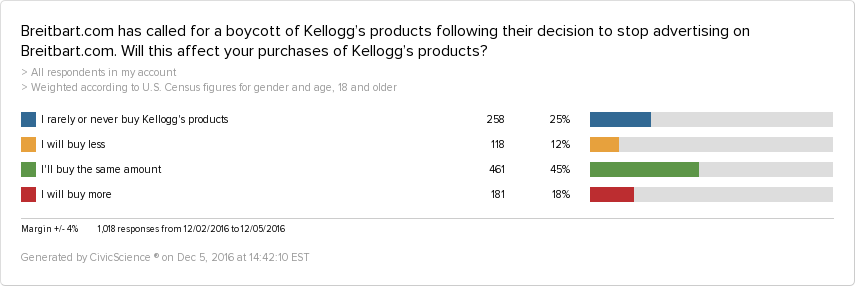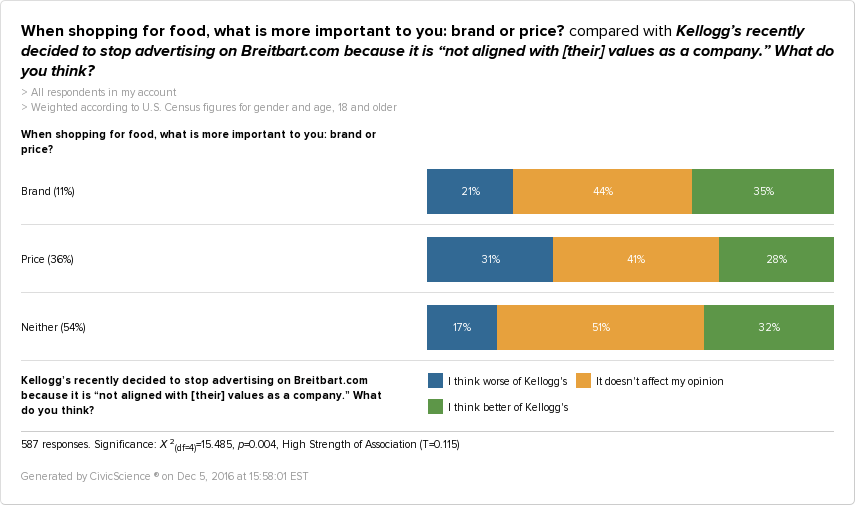The new frontier of American politics entered yet another dimensions last week, over the dust-up between consumer goods company, Kellogg’s, and politically-conservative publishing company, Breitbart. In case you weren’t paying attention, Kellogg’s made the decision to stop advertising on Breitbart sites in protest of the company’s political ideology. Breitbart, in turn, called on its readers to boycott Kellogg’s products.
Publishers gain and lose advertisers all the time. But when publishers, particularly those with an ardent following like Breitbart’s, actively seek retribution against those advertisers, how much damage can they do? In today’s extremely divided socio-political landscape, how worried should Kellogg’s be?
Well, let’s see. We asked about the issue two different ways:


THE DATA
The first question above allowed us to look at results just through the lens of Kellogg’s customers. This gauged the reaction of everyone. The first notable takeaway is how similar these two results are. In both cases, the pro-Kellogg’s sentiment outweighed the anti-Kellogg’s sentiment by almost exactly 3 to 2 (18:12 in Q1 and 29:20 in Q2). Mathematically speaking, this looks like a win for Kellogg’s.
As expected, the results broke hard along party lines. Republican respondents were more likely to oppose Kellogg’s decision. Democrats were more likely to support it. The difference, however, is that Republicans weren’t nearly as unified in their anti-Kellogg’s sentiment. Political Independents also broke strongly in Kellogg’s favor, further tipping the scales.
Demographically, the results were more favorable for Kellogg’s as well. Women were much more likely than men to be either pro-Kellogg’s or unaffected by the news – and women still do the majority of grocery shopping in the U.S. Support for Kellogg’s is highest among people aged 35-44, right in the sweet-spot of older Millennial and younger GenX parents who are buying boxes of cereal for their kids.
Perhaps most importantly for Kellogg’s, we looked at the correlation below (and don’t drive yourself crazy trying to make sense of the chart – I’ll explain it):

What we see here is that the people most likely to think less of Kellogg’s are price-conscious, not brand-conscious shoppers. It means they probably weren’t loyal to the brand in the first place. Brand-loyal consumers were the most likely to support Kellogg’s.
CONCLUSION
Based on these numbers, it’s possible that Kellogg’s may actually gain more customers than they lose over the Breitbart scuffle – with the majority of consumers remaining unaffected by the whole ordeal. Kellogg’s may even go so far as to promote the battle, using it as a mechanism to highlight the company’s social consciousness and values.
That said, it’s not safe to conclude that the same would be true of any brand that took a stand against Breitbart. A more male-centric or older-oriented brand might feel a bigger pinch if Breitbart’s audience boycotts it.
Obviously, before you make any big decisions to pull advertising from a politically-charged media publisher, think about the potential consequences among your core customer. It looks like Kellogg’s thought it through.








